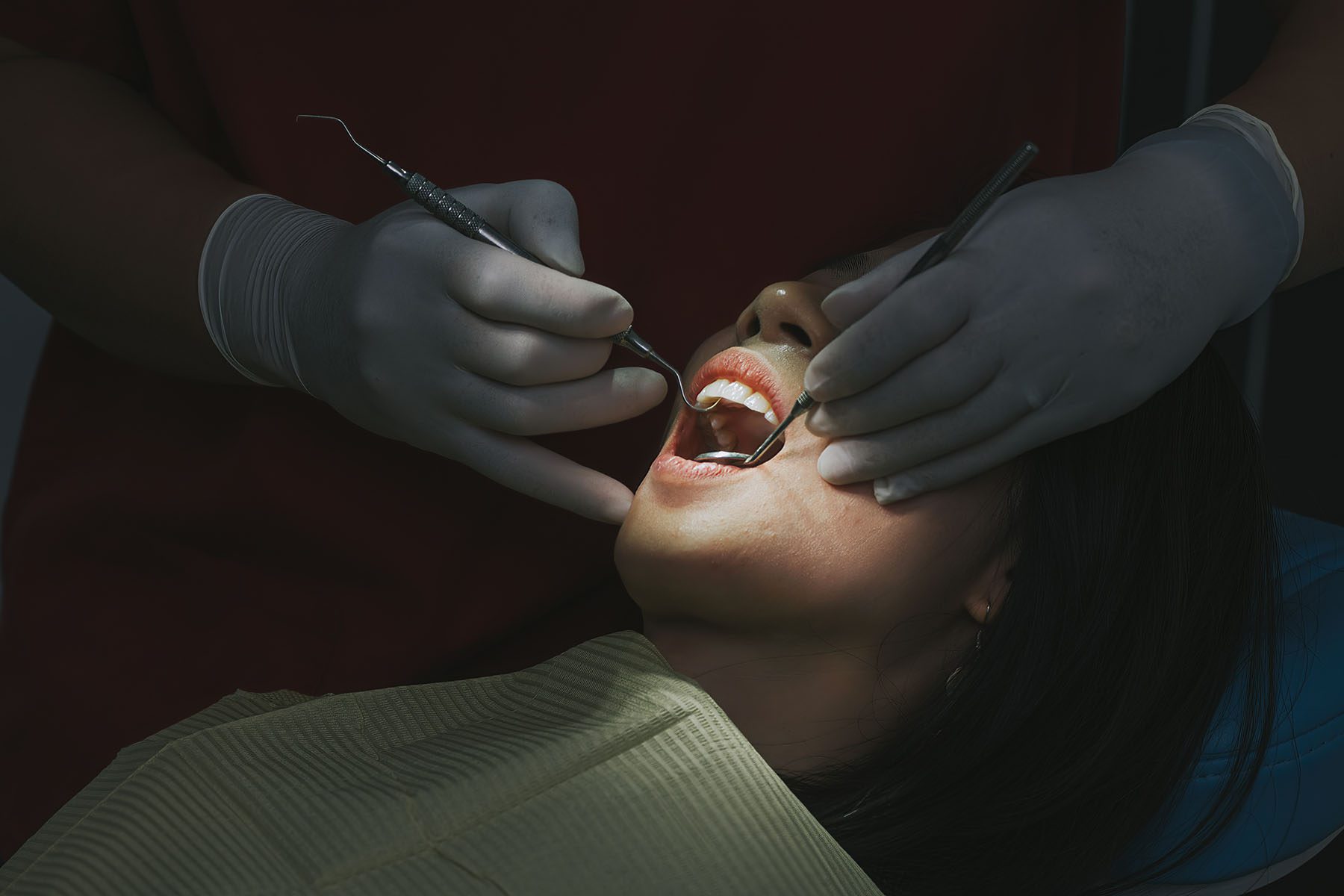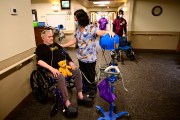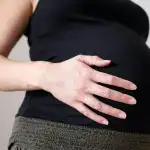What do you want to know about health care? We want to hear from you, our readers, about what we should be reporting and how we can serve you. Get in touch here.
Over a million Americans have begun losing Medicaid coverage, among them postpartum parents who relied on it for dental care that helped protect their health during pregnancy and beyond.
Medicaid coverage varies by state, and while federal law requires Medicaid dental coverage for patients up until age 21, there are no such requirements beyond that age. According to the Centers for Medicare and Medicaid Services, there is no separate enrollment for dental services. Rather, if a person is eligible for Medicaid, they are eligible for all benefits that the state elects to cover, including dental benefits. But not every state includes dental benefits for adults in their Medicaid coverage.
Like many low-income pregnant people, Brittany Baker was able to access Medicaid coverage during her pregnancy. Because she was pregnant when Congress passed the Families First Coronavirus Response Act, she had been able to maintain her health insurance throughout the duration of the COVID-19 public health emergency.
The legislation mandated that Medicaid, the health care program for low-income people, keep beneficiaries continuously enrolled until the end of the public health emergency. Millions of new beneficiaries were able to enroll in Medicaid during the pandemic, and no one who was enrolled in the program as of March 18, 2020, could lose coverage.
That continuous enrollment is being phased out. As of April 1, states were no longer required to maintain continuous coverage for beneficiaries. Up to 15 million people may lose health care coverage in the coming months: some because they are no longer eligible and others because they may fail to complete the required paperwork to keep their coverage.
-
Read Next:
As pandemic-era relief measures have been stripped away, mothers of color, like Baker, have been disproportionately impacted by the rollback of the pandemic security net. For nearly two years, Baker has been quoted in news articles — telling her story about how the expiration of the expanded child tax credit left her with barely any extra money to make ends meet. Now, with Medicaid disenrollment underway, she is worried about the future of her health care as well.
As someone who is legally blind, Baker emphasized the importance of having access to dental and vision insurance during the public health emergency as a part of her Medicaid coverage. She said she used her coverage during pregnancy to pay for an emergency dental appointment.
“If I have to pick up coverage through my job, that’s going to bring another strain onto my family because that’s another bill I cannot afford,” Baker told The 19th.
In Ohio, where Baker lives, 30,000 people have already been disenrolled from Medicaid for procedural reasons.
-
Read Next:
“People who lose Medicaid and do not have other coverage are likely to have a harder time accessing care, including dental care,” said Robin Rudowitz, the vice president and director for the Program on Medicaid and the Uninsured at KFF, the health policy organization previously known as the Kaiser Family Foundation.
A survey released by KFF last month found that more than four in 10 people whose sole coverage is Medicaid say that if they were to lose their Medicaid coverage, they would not know where to look for other coverage or they would end up uninsured.
Postpartum dental care is essential because a child’s oral health is closely linked to that of the birthing parent. Since every state provides dental coverage for Medicaid enrollees under 21, ensuring that the birthing parent is ensured for at least a year after birth will allow for coverage parity among parent and child.
Until the lifting of the continuous enrollment period, parents who enrolled in Medicaid while pregnant were able to access dental care for much longer than the 60-day postpartum minimum. That may no longer be the case. Medicaid will continue to cover their children’s dental care, but beyond the 60-day postpartum minimum, not every state offers dental benefits for adults, so even if a parent reapplies and receives Medicaid coverage, dental may no longer be part of the package.
Although 33 states have already implemented provisions to extend postpartum care to at least 12 months after the end of pregnancy — what the Centers for Disease Control and Prevention considers to be the end of the postpartum period — the remaining states have not. Mississippi and Texas, states with some of the worst maternal health outcomes, have neither extended postpartum care nor expanded the threshold to qualify for Medicaid, leaving postpartum people in those states particularly vulnerable.
This presents a distinct risk for postpartum people who plan to have more children. A recent report released by CareQuest Institute for Oral Health, a national nonprofit dedicated to making dental care more accessible, found that approximately 60 to 75 percent of pregnant people experience oral health issues that raise the likelihood of poor birth outcomes and major complications.
The report also found: hormonal changes during pregnancy increase the risk of oral disease; poor oral health can exacerbate diabetes and hypertension; and poor oral health during pregnancy is linked to negative birth outcomes like preeclampsia.
This adds a particular layer of risk for Black women, who are already 27 percent more likely to experience severe pregnancy complications than White women.
“Good oral health is an important part of good overall health, which is especially important during pregnancy and postpartum, as untreated dental disease can be harmful to mother and baby,” said George R. Shepley, the president of the American Dental Association (ADA), the largest and oldest national dental association. In a letter sent to the Centers for Medicare and Medicaid Services in 2021, the group advocated for maternal oral health to be considered an essential health benefit for one year postpartum.
According to Myechia Minter-Jordan, the president and CEO of CareQuest, expanding dental health care benefits would help to alleviate the disparity that exists among people of color, who are much less likely to be able to access dental care than their White counterparts.
“We know that Black and Hispanic adults report that they’ve never been to a dentist at more than five times the rate of White adults. We know that Black and Hispanic individuals that are living in areas that are economically depressed have a higher risk of tooth decay than White individuals,” Minter-Jordan said in an interview with The 19th.
-
Read Next:
According to an analysis of data from the Pregnancy Risk Assessment Monitoring System, half of women who were insured by Medicaid at the time of their delivery were uninsured prior to their pregnancy. This disparity is particularly stark in the 12 states, most of them in the South, that have not expanded Medicaid.
The CareQuest report suggests policy changes that can reduce those risks, including extending postpartum Medicaid dental coverage for birthing parents from 60 days to at least 12 months postpartum. This provision, which would have the greatest impact on postpartum people living in states that have not expanded Medicaid, has already been implemented in states like Maryland and Tennessee. Officials in those two states later extended dental care to all adult Medicaid enrollees at the beginning of this year.
Meanwhile, last month a class-action lawsuit was settled in New York that paves the way for the state’s 5 million adult enrollees to receive dental coverage. Since the suit was filed in 2018, its lead plaintiff died without receiving the replacement dentures he needed. Now, millions of other New Yorkers will have access to insurance that covers dental implants, replacement dentures and most root canals.
Minter-Jordan finds hope in this settlement and believes it may send a ripple effect across the country and pave the way for similar expansions of dental care.
“We know sometimes policy change takes a long time, but we have people that are fired up and energized around this,” she said.









